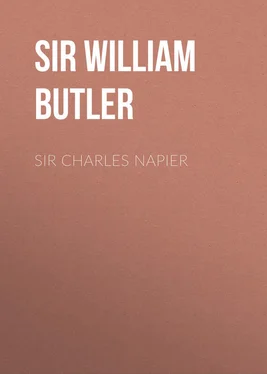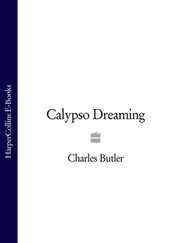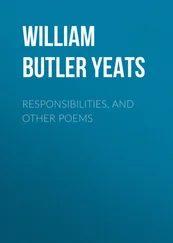William Butler - Sir Charles Napier
Здесь есть возможность читать онлайн «William Butler - Sir Charles Napier» — ознакомительный отрывок электронной книги совершенно бесплатно, а после прочтения отрывка купить полную версию. В некоторых случаях можно слушать аудио, скачать через торрент в формате fb2 и присутствует краткое содержание. Жанр: foreign_antique, foreign_prose, на английском языке. Описание произведения, (предисловие) а так же отзывы посетителей доступны на портале библиотеки ЛибКат.
- Название:Sir Charles Napier
- Автор:
- Жанр:
- Год:неизвестен
- ISBN:нет данных
- Рейтинг книги:3 / 5. Голосов: 1
-
Избранное:Добавить в избранное
- Отзывы:
-
Ваша оценка:
- 60
- 1
- 2
- 3
- 4
- 5
Sir Charles Napier: краткое содержание, описание и аннотация
Предлагаем к чтению аннотацию, описание, краткое содержание или предисловие (зависит от того, что написал сам автор книги «Sir Charles Napier»). Если вы не нашли необходимую информацию о книге — напишите в комментариях, мы постараемся отыскать её.
Sir Charles Napier — читать онлайн ознакомительный отрывок
Ниже представлен текст книги, разбитый по страницам. Система сохранения места последней прочитанной страницы, позволяет с удобством читать онлайн бесплатно книгу «Sir Charles Napier», без необходимости каждый раз заново искать на чём Вы остановились. Поставьте закладку, и сможете в любой момент перейти на страницу, на которой закончили чтение.
Интервал:
Закладка:
Thus was Napier taken prisoner. From this narrative we get many side-lights upon many subjects. Firstly, the composite character of Napoleon's army in Spain, and the fact that the Frank fights with the chivalry of the true soldier; it is the Italian who is all for murder. Secondly, we find all through this narrative of Napier's that our own soldiers were almost wholly Irish. This Fiftieth Regiment which he commands is called the West Kent, but its soldiers are almost to a man Irish. 2 2 "The Fiftieth Regiment, although called the West Kent, was chiefly formed of Irishmen." – Napier's Military Law .
The Forty-Second man who appears on the scene, although nominally a Highlander, is in reality an Irishman. Now, as we proceed further in the narrative, we come to one of the most singular pictures of a Celtic soldier ever put upon paper.
We had not proceeded far up the lane (continues Napier), when we met a soldier of the Fiftieth walking at a rapid pace. He instantly halted, recovered his arms, and cocked his piece, looking fiercely at us to make out how it was. My recollection is that he levelled at Guibert, and that I threw up his musket, calling out, "For God's sake, don't fire. I am a prisoner, badly wounded, and can't help you; surrender." – "For why would I surrender?" he cried aloud, with the deepest of Irish brogues. "Because there are at least twenty men upon you." – "Well, if I must surrender – there," said he, dashing down his firelock across their legs and making them jump, "there's my firelock for yez." Then coming close up he threw his arm round me, and giving Guibert a push that sent him and one or two more reeling against a wall, he shouted out, "Stand back, ye bloody spalpeens, I'll carry him myself; bad luck to the whole of yez." My expectation was to see them fall upon him, but John Hennessey was a strong and fierce man, and he now looked bigger than he was, for he stood upon higher ground. Apparently they thought him an awkward fellow to deal with. He seemed willing to go with me, and they let him have his own way.
They are soon delivered over to a responsible officer. Napier is kindly treated by all the officers he meets; but the exigencies of war call them away, and he remains for two nights and a day exposed to cold and misery on the hill where the English magazine had been exploded a couple of days before the action. On the second day after the battle he is brought into Corunna and made comfortable in Marshal Soult's quarters. Hennessey had disappeared. It was only long months afterwards that Napier knew what had become of this extraordinary soldier; and his ultimate fate and that of the generous drummer Guibert deserve to be recorded.
On the night following the battle Hennessey disappeared. Before going he had unbuckled Napier's silver spurs, whispering at the same time that it was a measure of safety, as "the spalpeens" would be likely to murder the owner for the sake of the metal. Next morning he was marched off to the Pyrenees, but at Pampeluna he got away from his captors and made back across the whole breadth of the Peninsula for Oporto. On the road he sold one of the spurs, which he had managed to conceal all that weary way by hiding them under his arm. When Soult took Oporto three months after Corunna, Hennessey was again taken prisoner; but when the English crossed the Douro he again escaped by rushing at the sentry upon the prison and killing him with his own musket. When the first British battalion entered Oporto he joined them, marched with them to Talavera, and fought in that battle, where a cannon-ball carried off his cap. Hearing that George Napier was with the army, Hennessey found him out and told him the whole story of his brother's capture, and produced the remaining spur, which he still held on to. Then he returned to England to rejoin the Fiftieth – the regiment was at Hastings at the time. Garrison life did not suit Corporal Hennessey – as he had now become – so, remembering that he had a wife and child in Cork, he obtained a furlough to visit them, and walking across England, appeared in his native town in due time. Napier had meanwhile set out again for the Peninsula. On reaching Cork Hennessey heard this, and at once exclaiming, "Is it gone back and the regiment not with him? Thin, be my sowl, I'll niver stop behind, but it's off I'll be too!" he started back without waiting to see wife or child. On his first arrival in England from the Peninsula he walked to York, where Miss Napier was then living. Charles Napier had charged him on the night of Corunna to give the spurs to her if he succeeded in escaping. Hennessey never forgot the injunction; and at York, more than a year after the battle, he delivered the remaining spur to Miss Napier. They had been originally her gift to her brother when he obtained the rank of major before going to Spain in 1808.
Hennessey went back to the Peninsula and began again the old life of reckless daring, mixed with insubordination, drunkenness, and robbery. At last, in one of the battles of the Pyrenees, a cannon-ball carried off his head – a relief alike to his friends and foes, for the former were ever in fear that death at the hands of the provost-marshal would be his fate. The end of the brave Guibert is not less sad. Napoleon, upon hearing of his humane and gallant conduct, bestowed the Cross of the Legion upon him. Some man with better interest disputed the drummer's right to the distinction, and obtained the cherished decoration for himself. Guibert, enraged at his well-earned honour being robbed from him, forgot his higher honour, tried to desert, was taken and shot. What strange episodes of individual heroism dashed with human nature's weakest traits does war hold in its vast tragedy! What extremes of pathos and absurdity jostle each other daily along the road of conflict! In the fight at Elvina Napier's bosom friend and comrade, Charles Stanhope, was shot dead while leading on his men to support his senior officer then under the French guns. The two men thus fighting so valiantly had each a brother on Moore's staff – George Napier and Edward Stanhope. Both these aides-de-camp long searched for their brothers amid the dead and wounded. Stanhope's body alone was found, for Napier's capture was not known for months after the battle, and he was reckoned among the missing dead. The body of Stanhope was brought back to the bivouac and buried there. His surviving brother was passionately attached to him, and when the moment came to fill in the hastily-made grave he leant over it to take a last look at the dead man's face. At that moment a ball from the enemy struck him, but the thick folds of his cloak, which was worn rolled across his chest, stopped the bullet, and prevented Death from joining together in the same grave the brothers he had shortly before separated.
The army of Corunna reached England in a terrible condition. The men had embarked on the night of the 16th in great confusion, portions of regiments and corps getting on board any vessel they could reach in the darkness, without regard to order or number. No account of killed or wounded was ever obtained; but the total loss from the time the army quitted Portugal in October, 1808, until it arrived in England in the end of January, 1809, was not short of twelve thousand men and five thousand horses, and all its material had also been lost. A wild and impossible enterprise, pushed on against the advice of all trained and capable military opinion by the ignorance of the English Cabinet and its representative Mr. Frere. These people spoke of the genius of Napoleon and his generals as a gigantic bubble which had only to be pricked to vanish. The defeat of a brave but indifferent leader like the Duke of Abrantes at Vimieiro, where all the odds of numbers and surroundings were against him, made them believe that they had only to throw another army into the Peninsula and that it would at once combine with the Spaniards and march to Paris. They mistook Junot, in fact, for that extraordinary combination of Jupiter and Mars whom men called Napoleon Bonaparte, and Moore and his gallant troops paid the penalty of the mistake. Nor did the misfortunes of the soldiers end with the campaign. For months after their arrival in England the hospitals were filled with the fever-stricken victims; and many a soldier who had escaped the horrors of the retreat and the battle of Corunna laid his bones in the military graveyards of the south of England. But the authors of the misfortune did not suffer. Secure in a majority returned by a flagrant system of corruption, they laughed at the Opposition; and society, finding a great military scandal soon to divert it, quickly forgot all about the suffering, the misfortunes, and the glory of the campaign of Corunna.
Читать дальшеИнтервал:
Закладка:
Похожие книги на «Sir Charles Napier»
Представляем Вашему вниманию похожие книги на «Sir Charles Napier» списком для выбора. Мы отобрали схожую по названию и смыслу литературу в надежде предоставить читателям больше вариантов отыскать новые, интересные, ещё непрочитанные произведения.
Обсуждение, отзывы о книге «Sir Charles Napier» и просто собственные мнения читателей. Оставьте ваши комментарии, напишите, что Вы думаете о произведении, его смысле или главных героях. Укажите что конкретно понравилось, а что нет, и почему Вы так считаете.












